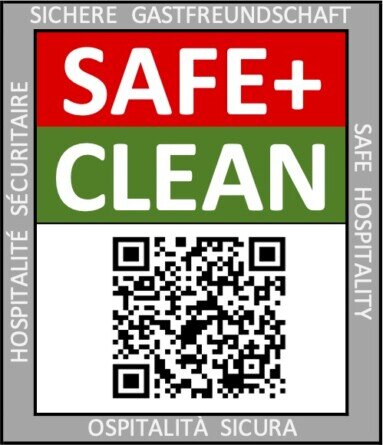SAFE+CLEAN CERTIFICATION
As a result of the ongoing COVID-19 pandemic, biological risk and safety standards in the civil sector are being redefined. Countries all over the world are or will soon be moving towards what has been labeled “Phase 3”: a phase —the duration of which remains undetermined— of controlled coexistence with the virus.
To maintain safety under Phase 3 conditions we all need to adopt new hygiene behaviors and we need to do so in internationally coordinated ways. Indeed, the current pandemic will likely change hygiene behavior standards in the long-term and on a global scale.
The SAFE+CLEAN certification is awarded to tourist facilities and venues (hotels, agritourism farms, wine cellars, B&Bs, restaurants, SPAs, museums, theme parks, etc.) that have committed to take up and continuously respect the new operational and behavioral hygiene and safety standards that have emerged in the context of the COVID-19 pandemic.
SAFE+CLEAN enables customers to identify providers that have chosen to be accountable for the safety of the facilities and venues they manage.
By guaranteeing adoption of best practices and respect of legal requirements for the management of biological risk, SAFE+CLEAN can strengthen customers’ as well as all stakeholders’ (employees, managers, supervisory authorities, proprietors) confidence that tourism activities will be conducted in all safety.
The SAFE+CLEAN certification process involves four simple steps:
- LEGAL ANALYSIS AND RISK EVALUATION
- INTERNAL CONTROL PLANNING AND ADOPTION OF SAFE+CLEAN STANDARD PROTOCOLS
- PERSONNEL TRAINING AND COMMUNICATION WITH GUESTS
- IN SITU AUDIT TO VERIFY CONFORMANCE AND AWARDING OF SAFE+CLEAN CERTIFICATION
The validity of all awarded SAFE+CLEAN certifications can be easily verified online via the QR-code included in the certification document provided to certified facilities and venues.
With 20 years of experience in consulting, including in the tourism sector throughout the last 10 years, FRANCIACORTA CONSULTING is ideally positioned to guide and support providers in achieving compliance with the new hygiene and safety norms that the global COVID-19 health emergency has called for.



